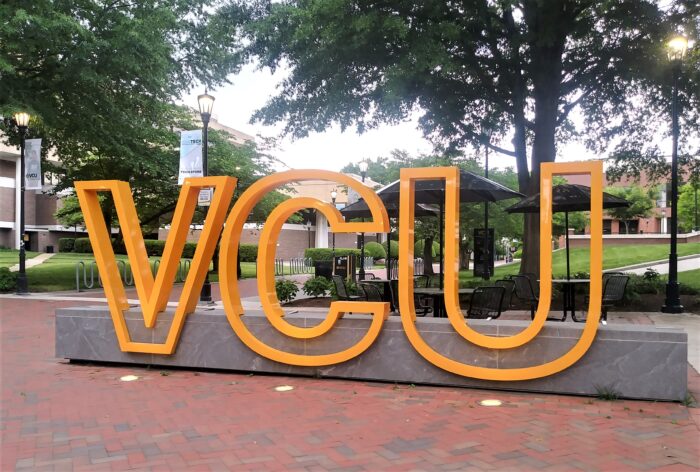
The VCU Board of Visitors voted last week to allocate $6.7 million in the fiscal year 2023 budget to cover the cost of the tuition hike it approved last month for in-state undergrads. BizSense file.
VCU has set aside funding for in-state undergraduate students to stave off its recently approved tuition hike for next year.
The Board of Visitors voted Friday to reallocate $6.7 million in VCU’s fiscal year 2023 budget to cover increased tuition for the university’s 20,000 in-state undergrads in the coming 2022-2023 academic year. The initiative won’t apply to other types of students.
VCU President Michael Rao said the state funding support earmarked for the university in the state’s newly approved budget helped make the student financial support possible. The tuition assistance and a separate budget shortfall will require cuts in the university’s spending plan, though no layoffs are planned.
“This is not going to be easy; it’s going to be difficult. We estimate it will cost, one-time, $6.7 million to provide these scholarships. This is in addition, though, to the $10.8 million that we have to permanently reduce and that was already planned,” Rao said. “Reallocations will be necessary, but because of the better-than-expected state support, and not the worst-case scenario we talked about in May, we’ll have the opportunity to mitigate significant elimination of positions.”
More than 60 full-time equivalents are expected to be permanently cut through attrition or via other non-layoff means to make up the budget shortfall, CFO Karol Kain Gray said. She added that an indeterminate number of additional roles could go unfilled as departments figure out how to navigate their budget reductions related to the one-time reallocation of funds toward the tuition aid.
“We’re anticipating there will be 62 full-time equivalent positions that will be eliminated because they leave or they go for another job, or they won’t be filled. I don’t recommend doing a layoff. We gave out the cuts and each unit will determine what positions they won’t fill, or they’ll realign based on their budget cuts,” Gray said. “The establishment of the one-time scholarship fund does not address any layoffs, but there might be reductions in staff.”
To cover the financial support, VCU will reduce money to be given to some of its academic departments and call upon reserves.
The nursing, pharmacy, business and medicine schools, in addition to the government and public affairs school, are anticipated to see enrollment shrink in the coming school year, as is the college of humanities and sciences. Those departments are accordingly getting smaller budgets, according to Gray.
The education, social work, engineering and arts schools are among those with projected enrollment increases, and they and other growing programs will receive increased funding.
“We wanted to continue incentivizing those schools that are doing well with enrollment growth,” she said.
VCU anticipates total revenue growth of $40.6 million and new expenses of $51.4 million, which left a $10.8 million hole that has been balanced out with $8.5 million in funding cuts to academic and administrative departments and the use of other measures.
VCU’s FY23 total budget is $1.5 billion, a 5 percent increase compared to the FY22 budget. The education and general fund in FY23 is $723 million, a 6.6 percent increase. The board voted in May to increase tuition by 3 percent.

The VCU Board of Visitors voted last week to allocate $6.7 million in the fiscal year 2023 budget to cover the cost of the tuition hike it approved last month for in-state undergrads. BizSense file.
VCU has set aside funding for in-state undergraduate students to stave off its recently approved tuition hike for next year.
The Board of Visitors voted Friday to reallocate $6.7 million in VCU’s fiscal year 2023 budget to cover increased tuition for the university’s 20,000 in-state undergrads in the coming 2022-2023 academic year. The initiative won’t apply to other types of students.
VCU President Michael Rao said the state funding support earmarked for the university in the state’s newly approved budget helped make the student financial support possible. The tuition assistance and a separate budget shortfall will require cuts in the university’s spending plan, though no layoffs are planned.
“This is not going to be easy; it’s going to be difficult. We estimate it will cost, one-time, $6.7 million to provide these scholarships. This is in addition, though, to the $10.8 million that we have to permanently reduce and that was already planned,” Rao said. “Reallocations will be necessary, but because of the better-than-expected state support, and not the worst-case scenario we talked about in May, we’ll have the opportunity to mitigate significant elimination of positions.”
More than 60 full-time equivalents are expected to be permanently cut through attrition or via other non-layoff means to make up the budget shortfall, CFO Karol Kain Gray said. She added that an indeterminate number of additional roles could go unfilled as departments figure out how to navigate their budget reductions related to the one-time reallocation of funds toward the tuition aid.
“We’re anticipating there will be 62 full-time equivalent positions that will be eliminated because they leave or they go for another job, or they won’t be filled. I don’t recommend doing a layoff. We gave out the cuts and each unit will determine what positions they won’t fill, or they’ll realign based on their budget cuts,” Gray said. “The establishment of the one-time scholarship fund does not address any layoffs, but there might be reductions in staff.”
To cover the financial support, VCU will reduce money to be given to some of its academic departments and call upon reserves.
The nursing, pharmacy, business and medicine schools, in addition to the government and public affairs school, are anticipated to see enrollment shrink in the coming school year, as is the college of humanities and sciences. Those departments are accordingly getting smaller budgets, according to Gray.
The education, social work, engineering and arts schools are among those with projected enrollment increases, and they and other growing programs will receive increased funding.
“We wanted to continue incentivizing those schools that are doing well with enrollment growth,” she said.
VCU anticipates total revenue growth of $40.6 million and new expenses of $51.4 million, which left a $10.8 million hole that has been balanced out with $8.5 million in funding cuts to academic and administrative departments and the use of other measures.
VCU’s FY23 total budget is $1.5 billion, a 5 percent increase compared to the FY22 budget. The education and general fund in FY23 is $723 million, a 6.6 percent increase. The board voted in May to increase tuition by 3 percent.




No mention of Rao’s 8% raise in tandem with tuition hikes…
Rao’s been riding the wave of the economy throughout his tenure, operating VCU as a property developer first and foremost. Now that the economy is slowing and the property market is softening, watch for him transition out of office and into the role of board member/fundraiser/C-suite glad-hander.
VCU has spent $40 Million over the last two years buying up property around the diamond district, including $16 Million JUST THIS MONTH to buy the ABC warehouse.
Now suddenly they’re “Broke” and need to make staff cuts to help students pay for that tuition hike?!? Please… Someone make this make sense…..